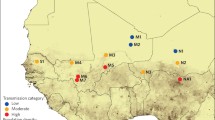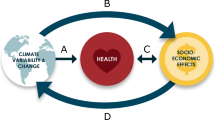Abstract
Climate change may well increase malaria morbidity and mortality. This would slow economic growth through increased spending on health care, reduced production, and less effective education. Slower economic growth would increase the incidence of malaria morbidity and mortality. The integrated assessment model FUND is used to estimate the strength of this negative feedback. Although climate-change-induced health problems may well substantially affect the projected growth path of developing regions, it is unlikely that climate change would reverse economic growth due to the impacts considered here. Even in sub-Saharan Africa, an area thought to be very sensitive to climate change and associated health effect, the impact, while detectable, is small and unlikely to reverse economic growth.
Similar content being viewed by others
References
Acemoglu D, Johnson S, Robinson JA (2003) The colonial origins of comparative development: an empirical investigation. Am Econ Rev 91:1369–1401
Azariadis C (1996) The economics of poverty traps – part one: complete markets. J Econ Growth 1:449–486
Batjes JJ, Goldewijk CGM (1994) The IMAGE 2 hundred year (1890–1990) Database of the global environment (HYDE).410100082, Bilthoven RIVM
Bhargava A, Jamison DT, Lau L, Murray CJL (2000) Modeling the effects of health on economic growth. GPE Discussion paper 33
Blackburn K, Cipriani GP (2002) A model of longevity, fertility and growth. J Econ Dyn Control 26:187–204
Bloom DE, Canning D, Sevilla J (2001a) The effect of health on economic growth: theory and evidence. Working Paper 8587, National Bureau of Economic Research, Cambridge, MA
Bloom DE, Canning D, Sevilla J (2001b) The wealth of nations: fundamental forces versus poverty traps, school of management and economics 2001/01. Queen’s University of Belfast, Belfast
Chan NY, Ebi KL, Smit F, Wilson TF, Smith AE (1999) An integrated assessment framework for climate change and infectious diseases. Environ Health Perspect 107(5):329–337
CIA (2002) The world factbook 2002. Central Intelligence Agency, Washington, DC
Dowlatabadi H (1997) Assessing the health impacts of climate change. Clim Change 35:137–144
Easterly W, Levine R (2003) Tropics, germs and crops: how endowments influence economic development. J Monet Econ 50:3–39
Fankhauser S, Tol RSJ (2001) On climate change and growth, research unit sustainability and global change FNU-10. Centre for Marine and Climate Research, Hamburg University, Hamburg
Fankhauser S, Tol RSJ, Pearce DW (1997) The aggregation of climate change damages: a welfare theoretic approach. Environ Resour Econ 10:249–266
Fankhauser S, Tol RSJ, Pearce DW (1998) Extensions and alternatives to climate change impact valuation: on the critique of IPCC working group III’s impact estimates. Environ Dev Econ 3:59–81
Gallup JL, Sachs JD, Mellinger A (1999) ‘Geography and economic development. CID Working Paper 1, Center for International Development, Harvard University, Cambridge
Haines A, Fuchs C (1991) Potential impacts on health of atmospheric change. J Public Health Med 13(2):69–80
Haines A, Parry ML (1993) Climate change and human health. J R Soc Med 86:707–711
Hammitt JK, Lempert RJ, Schlesinger ME (1992) A sequential-decision strategy for abating climate change. Nature 357:315–318
Kattenberg A, Giorgi F, Grassl H, Meehl GA, Mitchell JFB, Stouffer RJ, Tokioka T, Weaver AJ, Wigley TML (1996) Climate models – projections of future climate. In: Houghton JT, Meiro Filho LG, Callander BA, Harris N, Kattenberg A, Maskell K (eds) Climate change 1995: the science of climate change – contribution of working group I to the second assessment report of the intergovernmental panel on climate change, 1st edn. Cambridge University Press, Cambridge, pp. 285–357
Leggett J, Pepper WJ, Swart RJ (1992) Emissions scenarios for the IPCC: An update. In: Houghton JT, Callander BA, Varney SK (eds) Climate change 1992 – the supplementary report to the IPCC scientific assessment, 1st edn. Cambridge University Press, Cambridge, pp. 71–95
Maier-Reimer E, Hasselmann K (1987) Transport and storage of carbon dioxide in the ocean: an inorganic ocean circulation carbon cycle model. Clim Dyn 2:63–90
Martens WJM (1996) Global atmospheric change and human health: an integrated modelling approach. Clim Res 6(2):107–112
Martens WJM (1997) Health impacts of climate change and ozone depletion – an eco-epidemiological modelling approach. University of Maastricht, Maastricht
Martens WJM, Jetten TH, Rotmans J, Niessen LW (1995) Climate change and vector-borne diseases – a global modelling perspective. Glob Environ Change 5(3):195–209
Martens WJM, Jetten TH, Focks DA (1997) Sensitivity of malaria, schistosomiasis and dengue to global warming. Clim Change 35:145–156
Martin PH, Lefebvre MG (1995) Malaria and climate: sensitivity of malaria potential transmission to climate. Ambio 24(4):200–207
Masters WA, McMillan MS (2001) Climate and scale in economic growth. J Econ Growth 6(3):167–186
Matsuoka Y, Kai K (1995) An estimation of climatic change effects on malaria. J Glob Environ Eng 1:43–58
McMichael AJ (1997) Integrated assessment of potential health impact of global environmental change: prospects and limitations. Environ Model Assess 2:129–137
McMichael AJ, Ando M, Carcavallo R et al (1996) Human population health. In: Watson RT, Zinyowera MC, Moss RH (eds) Climate change 1995: impacts, adaptations and mitigation of climate change: scientific-technical analyses-contribution of working group II to the second assessment report of the intergovernmental panel on climate change, 1st edn. Cambridge University Press, Cambridge, pp. 561–584
Morita T, Kainuma M, Harasawa H, Kai K, Matsuoka Y (1994) An estimation of climatic change effects on malaria. Working paper, National Institute for Environmental Studies, Tsukuba
Murray CJL, Lopez AD (1996a) Global health statistics. Harvard School of Public Health, Cambridge
Murray CJL, Lopez AD (eds) (1996b) The global burden of disease – a comprehensive assessment of mortality and disability from diseases, injuries, and risk factors in 1990 and projected to 2020. Harvard University Press, Cambridge, MA
Nakicenovic N, Swart RJ (eds) (2001) IPCC special report on emissions scenarios. Cambrigde University Press, Cambridge
New M, Hulme M, Jones PD (1999) Representing twentieth century space–time climate variability, Part I: development of a 1961–1990 mean monthly terrestrial climatology. J Climate 12:829–856
Patz JA, Martens WJM (1997) Climate impacts on vector-borne disease transmission: global and site-specific analyses. J Epidemiol 6(4):S-145–S-148
Sachs J, Malaney P (2002) The economic and social burden of malaria. Nature 415:680–685
Schelling TC (1995) Intergenerational discounting. Energy Policy 23(4/5):395–401
Schimel D, Alves D, Enting I et al (1996) Radiative forcing of climate change. In: Houghton JT, Meiro Filho LG, Callander BA, Harris N, Kattenberg A, Maskell K (eds) Climate change 1995: the science of climate change-contribution of working group I to the second assessment report of the intergovernmental panel on climate change, 1st edn. Cambridge University Press, Cambridge, pp. 65–131
Schneider SH (1997) Integrated assessment modeling of global climate change: transparent rational tool for policy making or opaque screen hiding value-laden assumptions? Environ Model Assess 2:229–249
Shine KP, Derwent RG, Wuebbles DJ, Morcrette J-J (1990) Radiative forcing of climate. In: Houghton JT, Jenkins GJ, Ephraums JJ (eds) Climate change – the IPCC scientific assessment, 1st edn. Cambridge University Press, Cambridge, pp. 41–68
Tol RSJ (1999a) The marginal costs of greenhouse gas emissions. Energy J 20(1):61–81
Tol RSJ (1999b) Time discounting and optimal control of climate change – an application of FUND. Clim Change 41(3–4):351–362
Tol RSJ (1999c) Kyoto, efficiency, and cost-effectiveness: applications of FUND. Energy Journal Special Issue on the Costs of the Kyoto Protocol: A Multi-model Evaluation 130–156
Tol RSJ (1999d) Safe policies in an uncertain climate: an application of FUND. Glob Environ Change 9:221–232
Tol RSJ (1999e) Spatial and temporal efficiency in climate change: applications of FUND. Environ Resour Econ 14(1):33–49
Tol RSJ (2001) Equitable cost-benefit analysis of climate change. Ecol Econ 36(1):71–85
Tol RSJ (2002a) Estimates of the damage costs of climate change – part 1: benchmark estimates. Environ Resour Econ 21:47–73
Tol RSJ (2002b) Estimates of the damage costs of climate change – part II: dynamic estimates. Environ Resour Econ 21:135–160
Tol RSJ (2002c) Welfare specifications and optimal control of climate change: an application of FUND. Energy Econ 24:367–376
Tol RSJ (2002d) Emission abatement versus development as strategies to reduce vulnerability to climate change: an application of FUND, research unit sustainability and global change FNU-12. Centre for Marine and Climate Research, Hamburg University, Hamburg
Tol RSJ (2002e) Technology protocols for climate change: an application of FUND, research unit sustainability and global change FNU-14. Centre for Marine and Climate Research, Hamburg University, Hamburg
Tol RSJ, Dowlatabadi H (2001) Vector-borne diseases, climate change, and economic growth. Integrated Assessment 2:173–181
WHO 1990) Potential health effects of climatic change. World Health Organization, Geneva
WRI (2000) World resources database 2000–2001. World Resources Institute, Washington, DC
Author information
Authors and Affiliations
Corresponding author
Rights and permissions
About this article
Cite this article
Tol, R.S.J. Climate, development and malaria: an application of FUND . Climatic Change 88, 21–34 (2008). https://doi.org/10.1007/s10584-007-9253-4
Received:
Accepted:
Published:
Issue Date:
DOI: https://doi.org/10.1007/s10584-007-9253-4




